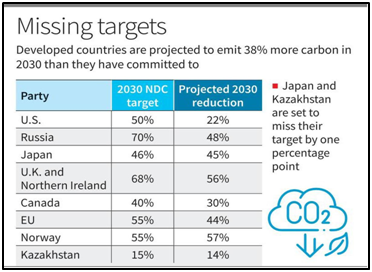Why in the News?
- According to a study published last week by the Council for Energy Environment and Water (CEEW), developed countries will end up emitting 38% more carbon in 2030 than they have committed to, going by current trajectories.
What’s in Today’s Article?
- About the Study (Objectives, Major Findings, Significance)
About the Study:
- Council for Energy Environment and Water (CEEW) is a Delhi-based thinktank.
- The CEEW published a report with the objective of tracking developed countries’ Emission Trajectories.
- The study aimed to find out whether the developed countries, responsible for over 75 per cent of historical emissions, are taking deep emission reductions at an adequate pace?
- The study aimed to analyse the emission trajectories of developed countries, covering historic and projected emissions in the six decades spanning 1990–2050.
Major Findings of the Study:

- The key findings of the study include:
- By 2030, developed countries will overshoot carbon emission targets by 38 per cent.
- Only two developed countries—Norway and Belarus—are on track to achieve their Nationally Determined Contributions (NDCs).
- Even with post-2030 reductions, developed countries' total emissions would still threaten 1.5°C target.
- Developed countries are projected to collectively emit around 3.7 giga tonnes extra carbon dioxide in 2030, against the reduction goals expressed in their NDCs under the 2016 Paris Agreement.
- This represents a 38 per cent emission overshoot, with the United States, European Union, and Russia responsible for 83 per cent of this.
- Further, only two developed countries—namely Norway and Belarus—are on track to achieve their reduction commitments by 2030.
- The mitigation efforts of developed countries impact the carbon budget available to developing nations, which need sufficient carbon space to address their economic and social development challenges and ensure a just transition.
- Further, currently, developed countries’ NDCs for 2030 collectively represent a 36 per cent reduction in emissions from their 2019 levels.
- This is less than the global average of 43 per cent that is required to keep the 1.5°C target alive.
Significance of these Findings:
- The report makes it clear that even in this critical decade (2020-30), developed countries are not projected to meet their 2030 NDC targets.
- This failure has implications for the limited global carbon budget available now, especially for developing countries like India.
- The projections also reveal that developed countries rely on drastically ramping up emission reductions after 2030.
- Even if all developed countries were to reach net zero by 2050, they would require more than four times the average annual reductions they achieved from 1990 to 2020.
- The study recommends that instead of relying on future events, developed countries should define clear year-on-year reduction plans to meet their targets in this critical decade.
- Further, to build trust, developed countries need to be reliable and stay committed to the Paris Agreement.









